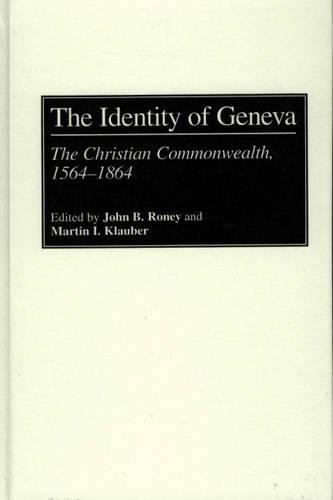
The Identity of Geneva: The Christian Commonwealth, 1564-1864
(Hardback)
Publishing Details
The Identity of Geneva: The Christian Commonwealth, 1564-1864
By (Author) Martin Klauber
By (author) John B. Roney
Bloomsbury Publishing PLC
Praeger Publishers Inc
19th March 1998
United States
Classifications
Tertiary Education
Non Fiction
Protestantism and Protestant Churches
Christianity
History of religion
274.9451
Physical Properties
Hardback
248
Width 156mm, Height 235mm
482g
Description
As one of the first Protestant republics, Geneva was a model of a modern Christian commonwealth in its pursuit of mutual religious, political, and economic enterprise. From John Calvin's death in 1564 to the Convention of Geneva, forerunner of the Red Cross, the foundation of Genevan identity remained the theology, polity, and spirit of Calvin. Although the initial effects of the Reformation in Geneva differed little from those in other free cities in early 16th century Europe, the movement was distinguished by the leadership of John Calvin, who offered a clear theological system and encouraged international connections through education, missions, and printing. By Calvin's death in 1564, Geneva's international reputation and leaderhsip were at an all-time high. Calvin's theology, polity, and spirit would remain as the core of Genevan identity. However, in the early 19th century, the Catholic population would outnumber the Protestant, and Geneva could no longer claim to offer international, Calvinist leadership or even religious solidarity. This volume contains essays on selected aspects of Genevan identity from the mid-16th to the mid-19th century. It begins with the origins of the image of Geneva, follows the city from the time of Calvin's death, and concludes with the transformation in Genevan identity that would accompany its demographic shifts. From its time as a Protestant republic in which Genevans envisioned themselves as a new community of God's chosen people who found mutual support in religious, political, and social enterprises, Geneva would come to follow a new model of political unity based on a broader Christian foundation, which would respect plurality and international cooperation.
Reviews
[T]his collection of essays is a good contribution to current scholarship in Genevan history.-American Historical Review
A thought-provoking work for all interested in the interactions of theology with culture.-Religious Studies Review
Recommended for upper-division undergraduate and graduate students; faculty and researchers.-Choice
The cumulative effect of the essays is to portray the broader religious, intellectual, and political changes in Europe from the sixteenth to the nineteenth centuries by using Geneva as a case study. Given the paucity of works in English on Geneva after Calvin's death in 1564, this book is also a handy introduction to the history of a city whose identity is still evolving.-Church History
The volume makes a strong first step toward addressing the lack of English scholarship on the seventeenth through nineteenth centuries of Genevan history.-Sixteenth Century Journal
This is a well-planned and tightly organized project in which each of those who contribute has something useful to say.-English Historical Review
[T]his is a good book and an edifying read.-Canadian Journal of History/Annales
[T]his is a good book and an edifying read.Canadian Journal of History/Annales
"This collection of essays is a good contribution to current scholarship in Genevan history."-American Historical Review
"This is a good book and an edifying read."-Canadian Journal of History/Annales
"[T]his collection of essays is a good contribution to current scholarship in Genevan history."-American Historical Review
"[T]his is a good book and an edifying read."-Canadian Journal of History/Annales
"A thought-provoking work for all interested in the interactions of theology with culture."-Religious Studies Review
"Recommended for upper-division undergraduate and graduate students; faculty and researchers."-Choice
"The volume makes a strong first step toward addressing the lack of English scholarship on the seventeenth through nineteenth centuries of Genevan history."-Sixteenth Century Journal
"This is a well-planned and tightly organized project in which each of those who contribute has something useful to say."-English Historical Review
"The cumulative effect of the essays is to portray the broader religious, intellectual, and political changes in Europe from the sixteenth to the nineteenth centuries by using Geneva as a case study. Given the paucity of works in English on Geneva after Calvin's death in 1564, this book is also a handy introduction to the history of a city whose identity is still evolving."-Church History
Author Bio
JOHN B. RONEY is Associate Professor of History at Sacred Heart University in Fairfield, Connecticut. He is the author of The Inside of History: Jean Henri Merle d'Aubigne and Romantic Historiography (Greenwood, 1996) - MARTIN I. KLAUBER is an instructor in History and Religious Studies at Barat College and a Visiting Professor of Church History at the Trinity Evangelical Divinity School, Illinois. He is the author of Between Reformed Scholasticism and Pan-Protestantism: Jean Alphonse Turretin (1671-1737) and Enlightened Orthodoxy at the Academy of Geneva (1994), and co-editor, with Michael Bauman, of Historians of the Christian Tradition (1995).
